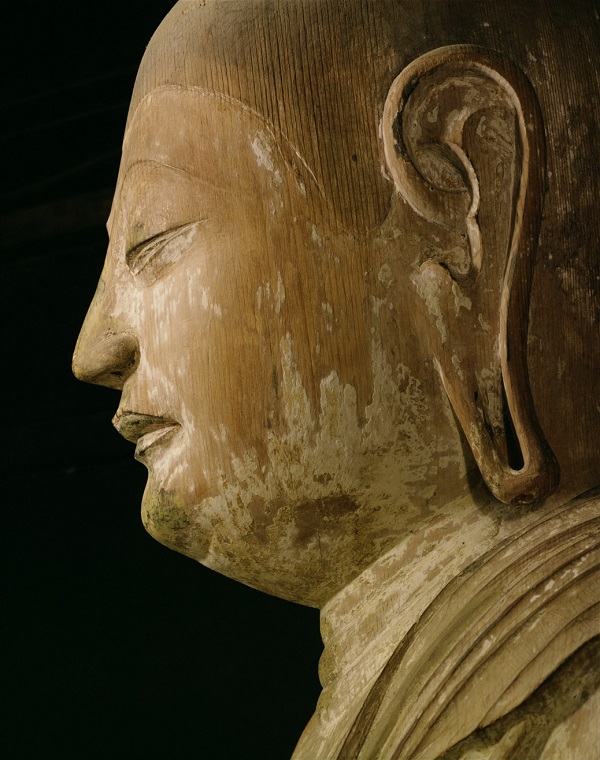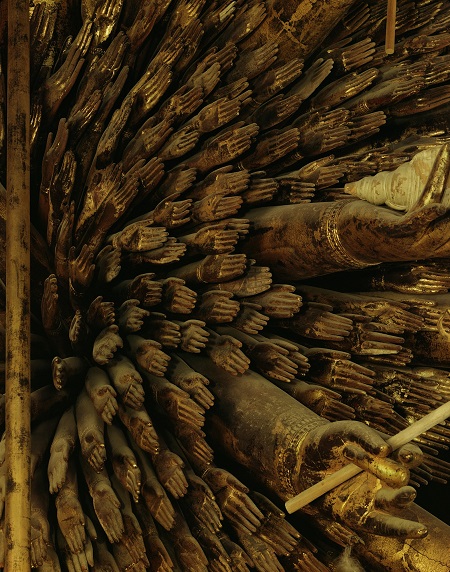
Left Profile of the Head of the Seated Shaka Nyorai (Sakyamuni) at the Hall of Miroku, Muroji Temple
The Tokyo Photographic Art Museum will adhere to relevant guidelines and take necessary measures to prevent the spread of the novel coronavirus. We ask for your understanding regarding inconveniences for this time. [Notices to Visitors]
Domon Ken: A Pilgrimage to Ancient Temples
Mar. 18—May. 14, 2023
- Mar. 18—May. 14, 2023
- Closed Mondays (except May 1st is open)
- Admission:Adults ¥1,100 / College Students, Over 65 ¥900 / High School and Junior High School Students ¥700
It is recommended that you use the online ticket system (timed entry reservation.)![]()
click here for online ticket system: Webket
Ken Domon was a major contributor to the history of Japanese photography. He left behind unforgettable works with subjects spanning documentaries, portraits, antiques, architecture, and landscapes. The first volume of his life’s work, Koji Junrei (“Pilgrimage to Ancient Temples”), was published in 1963. The year 2023 marks the 60th anniversary of that publication. Domon, who made many pilgrimages to Buddhist statues dating back to before the Second World War, carefully studied and photographed old temples and Buddhist statues selected by his discerning eyes, creating a unique style in which he captured architectural details and the hands, feet and mouths of Buddhist statues in closeup fashion. During the production of Koji Junrei, he collapsed from a cerebral hemorrhage, but soldiered on with an indomitable spirit even after being confined to a wheelchair, completing the five-volume collection in 1975.
The exhibition consists of approximately 120 works, including some of Domon’s representative color photos, emblematic images of the statue of a seated Shaka Nyorai (Shakyamuni) at Muroji Temple, which fascinated the photographer, and black-and-white photographs of massive, wood-carved Buddhist statues from the early Heian period, among others. We invite you to enjoy the dynamic, uniquely Japanese aesthetics that Domon developed as he explored the essence of his subject matters.
Detail of the Face of the Seated Shaka Nyorai (Sakyamuni) at Kondo Hall, Asukadera Temple, 1964
View of the Three-Storied Pagoda at Yakushiji Temple, 1961
Detail of the Left-side Arms of the Standing Senju Kannon (Thousand-Armed Avalokiteshvara) at Kondo Hall, Toshodaiji Temple, 1963
Standing Juni Shinsho (Twelve Heavenly Generals) at Kondo Hall, Muroji Temple (from left: the Snake General, the Sheep General, the Monkey General, and the Dragon General), ca. 1943
The Head of the Standing Kichijoten Goddess in the Main Hall, Joruriji Temple, 1965
Left Profile of the Head of the Seated Dainichi Nyorai (Mahavairocana) in the Furuzono Cluster of Stone Buddhas, Usuki City, 1962
Photographs courtesy of the Ken Domon Museum of Photography
Domon Ken (1909-1990)
Born in Sakata, Yamagata Prefecture in 1909. In 1935 Domon joined Nihon Kobo, a pioneer in Japanese photojournalism. His career as a photojournalist, covering the turbulent events transpiring in Japan continued for about 45 years, until 1979, when he collapsed from a cerebral thrombosis. He left behind many immortal works such as Bunraku, Hiroshima, Chikuho no Kodomotachi (“The Children of Chikuho”), Fubo (“Appearance”), and Koji Junrei (“Pilgrimage to Ancient Temples”). He visited Muroji Temple in 1939, and thereafter continued travelling about Japan, photographing Buddhist statues even during the height of the war. In 1960, he suffered a cerebral hemorrhage, which made it difficult for him to operate a 35mm camera. Consequently, he switched to a large format camera as he continued his work to compile the five-volume Koji Junrei.
Co-organizers: Tokyo Metropolitan Foundation for History and Culture, and Tokyo Photographic Art Museum
Contributor: Sakata Cultural Foundation Ken Domon Museum of Photography
*The schedule is subject to change. Any further changes will be announced.
*The exhibition has been changed from the "Henri Cartier-Bresson" scheduled for the same period.

